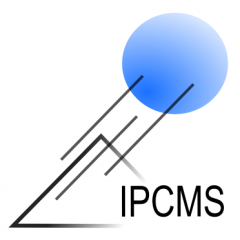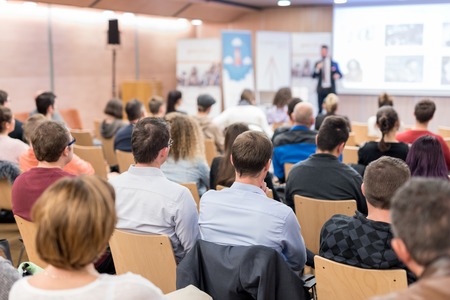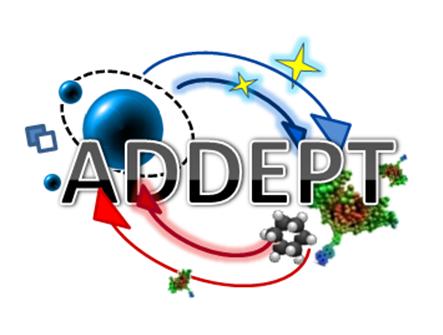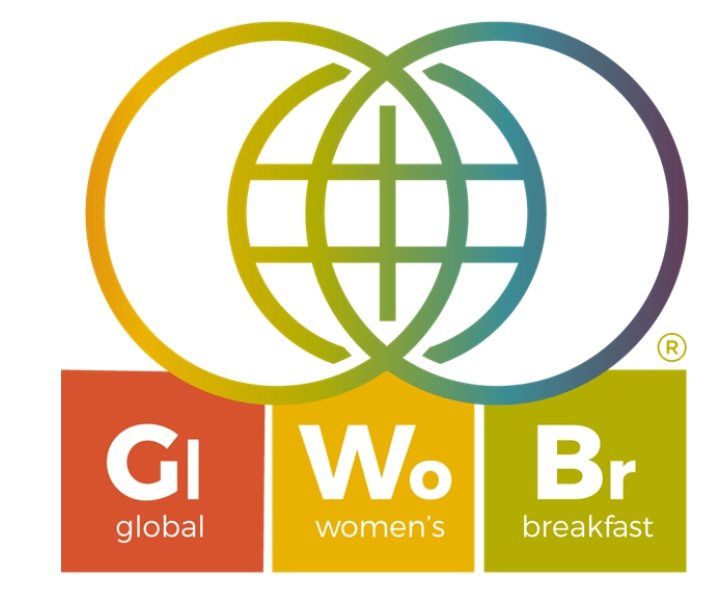Orateur : Olivier MAURY, Laboratoire de Chimie de l’ENS Lyon, 07
Séminaire IPCMS présenté par Xavier WAINTAL
Orateur : Xavier WAINTAL (CEA Grenoble)
Séminaire IPCMS présenté par Amalio FERNÁNDEZ-PACHECO
Orateur : Amalio FERNÁNDEZ-PACHECO (Institute of Applied Physics, Vienna, Austria)
Journée scientifique de la plateforme MET
Pour information,
– cette journée est ouverte à toutes et tous,
– il y aura un vote des participants pour le choix du meilleur logo pour la plateforme MET.
En espérant vous voir nombreuses et nombreux à cette occasion
IPCMS Postdoc-PhD meeting
The ADDEPT will organize a meeting where all postdocs of the lab are invited to share their “final push” experiences as former 3rd year PhD, tell about what they did wrong, what to be careful at, what they would do differently, useful tips, to the actual 3rd year PhD students of the lab (2nd year are also welcome). It will take the form of a 2hours (at most) free, respectful and kind discussion.
This meeting will take place on Wednesday 21st February, from 4p.m. to 6p.m., at the IPCMS cafeteria.
Séminaire IPCMS présenté par Dr. Laurence CROGUENNEC
Dr. Laurence CROGUENNEC (Institut de Chimie de la Matière Condensée de Bordeaux)
Directrice de recherche CNRS, directrice adjointe de l’ICMCB
Résumé :
Known from all chemists for decades, the sodium-ion battery technology was dethroned in the 1980s by the lithium-ion battery that offered better performance. The major interest of sodium is to be a sustainable resource in comparison to lithium. The technology is thus back on the scene as an ecological, economical and reliable alternative to the lithium-ion battery. I will present the challenges of this research field, and highlight some of our results. I will show how we were able to (i) discover a new family of NASICON structural type materials NaxV2(PO4)3, and (ii) demonstrate how the chemistry of mixed anions and in particular the competition between the ionic bond V-F and the very covalent vanadyle-type bond V=O has an impact on the properties of Na3V2(PO4)2F3-yOy. I will demonstrate that only the in-depth control of the relationship synthesis/composition/atomic and electronic structure allows to tune the properties in the battery. I will illustrate also that monitoring in situ and operando, especially at large scale facilities, the synthesis of electrode materials and their evolution when used in batteries is essential. Changes in the composition and structure of the materials must be studied in their environment (in situ), and in real time (operando) during their preparation or operation of the battery because they are most often in conditions out of equilibrium. The experiments thus conducted allow to study the dynamics of reactions, essential for the understanding of the material and optimization of its performance in the electrochemical storage system.
IUPAC Global Women’s Breakfast
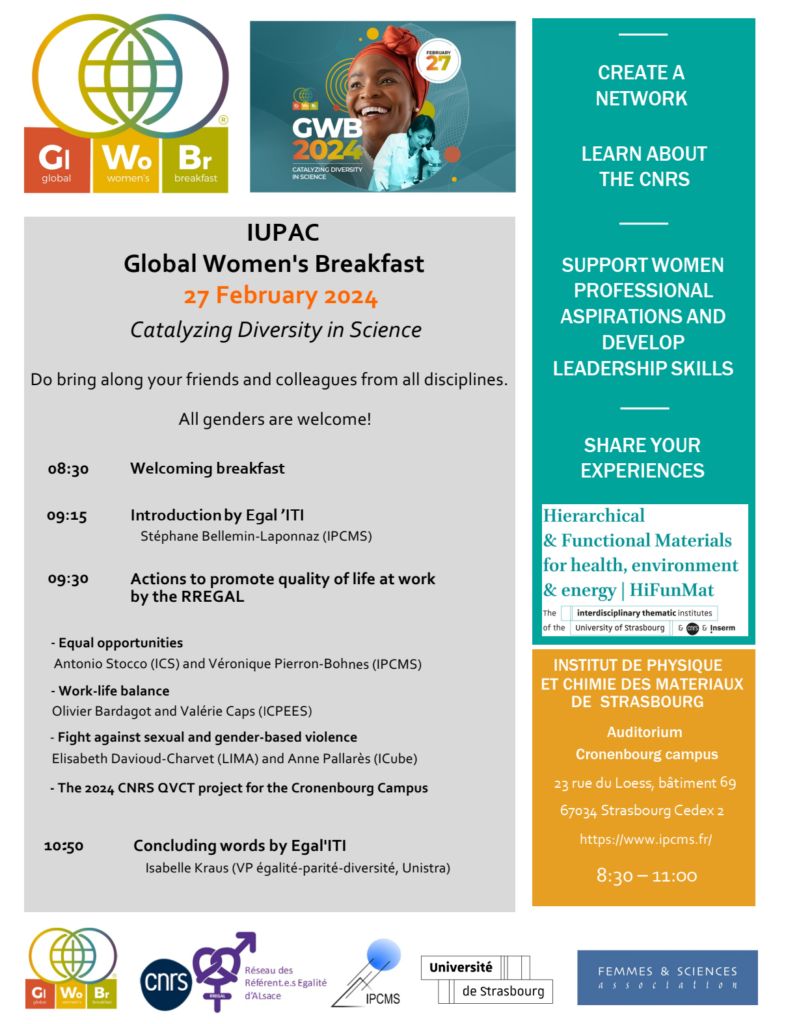
Assemblée Générale de l’ADDEPT
Vous êtes tous conviés à y assister, celle-ci durera environ 1h et sera suivie d’un petit pot à la cafétéria. Vous pourrez en apprendre plus sur nous, nous poser vos questions ou émettre des suggestions, et également intégrer l’association si le coeur vous en dis ! À ce propos, l’ADDEPT cherche justement de nouveaux membres! Avis aux intéressés (c’est gratuit et on fait des trucs sympas)!
Vous pourrez également renouveler (ou démarrer) votre adhésion à l’ADDEPT ce jour là, pour vous permettre d’obtenir des tarifs préférentiels sur nos évènements de l’année. Les tarifs étant toujours de 10euros pour les permanents, 5euros pour les doctorants et post doctorants.
L’AG sera suivie de la traditionnelle dégustation de la galette des rois de l’ADDEPT!
En espérant vous y voir nombreux pour soutenir cette belle association de l’IPCMS qu’est l’ADDEPT
Contact : Xavier Henning
Séminaire IPCMS présenté par Florence GAZEAU
Florence GAZEAU (MSC Med Lab and IVETh integrator , 45 rue des Saints Pères, 75006 Paris, France)
Résumé : The clinical use of extracellular vesicles (EVs) will progressively become a reality in view of the number of ongoing clinical trials worldwide harnessing EV potency for tissue healing, resolution of inflammation (notably in Covid 19 patients), vaccination, drug delivery or cancer therapies, among others. EVs, encompassing a variety of cell shed nanoscale membrane vesicles (exosomes, ectosomes, microvesicles, OMV from bacteria…), are released by all cell types, either spontaneously or after induction, and circulate in all body fluids playing an active role in many physio- and pathological processes. EVs contribute to intercellular communication and immunomodulation via delivering bio-molecules like nucleic acids, proteins, and lipids that modify the recipient cells. Numerous biological effects of cell therapy rely on the cells’ secretome and, in particular on biomolecules contained in EVs, which are now studied as potential therapeutic agents to recapitulate a substantial part of the parental cell’s benefits, especially for stem cell-derived EVs. However the clinical translation of EV-based biotherapies face numerous challenges such as cost-effective large scale bioproduction compatible with a clinical use (GMP manufacturing), reproducibility from one batch to another and difficulties to isolate, characterize and identify the most potent nanosized subfractions from a complex and heterogeneous cell secretome. In addition, the technologies to engineer EVs in a pre-production or post-production step to convey specific proteins, nucleic acids, drugs and nanoparticles and improve or control their specific targeting and therapeutic activities are still in their infancy. In this presentation, we will present the breakthrough technologies for high throughput bioproduction, engineering and multimodal IA-assisted characterization of therapeutic stem cell-derived EVs, as well as EV delivery, that have been developed in our lab and led to the creation of two spin off. These technologies, based on multidisciplinary and physics-powered approaches (turbulence approach for high yield high throughput EV bioproduction and loading, EV delivery in a carrier gel, multimodal analysis tool box) are available for the industrial and academic partners on our innovation hub IVETh (https://iveth.u-paris.fr/) labelized as a national industrial integrator biotherapy-bioproduction in 2022
